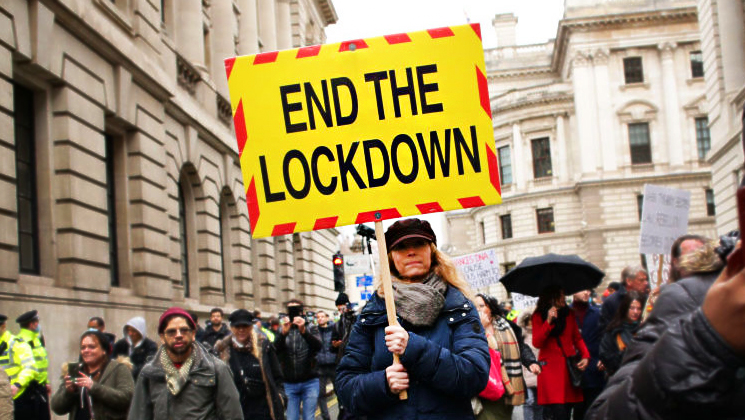A new poll on the public’s views of Covid restrictions has been doing the rounds this week, and the results may come as a shock to many. They find that, of the people surveyed, 40% wished to continue with masks permanently, 26% were in favour of shutting casinos and clubs forever, and an astonishing 19% were in favour of a permanent 10pm curfew. Has Britain become a nation of authoritarians?
NEW: @ipsosmori polling for The Economist shows some Brits support anti-covid restrictions *permanently*, regardless of covid risk. Inc:
– 19% for nighttime curfews
– 26% for closing casinos and clubs
– 35% for travel quarantine
– 40% for maskshttps://t.co/bcYpSbCFNB pic.twitter.com/I7K3fEn2YC— Matthew Holehouse (@mattholehouse) July 8, 2021
We’ve seen results like this before. Over the last 16 months, poll after poll has shown high levels of public approval for lockdowns and restrictions, which feels hard to square with the scenes of people emphatically celebrating the England victory on the streets this week.
That may be because, as a new study shows, the polling data is not all that it seems. Examining public attitudes towards restrictions, researchers at the Royal Society asked a sample of the public about their opinions on lockdown, twice over a 6 month period, first in June 2020, then again in December. Beyond standard questions about approval for lockdown and restrictions, they dug a little deeper, and asked participants what their views were on topics such as the side effects and trade-offs of restrictions, how they judged the threat of covid, and whether they felt this threat was mostly an individual threat, or a societal threat.
As anticipated, participants were in favour of lockdowns and almost all restrictions suggested. But when they were asked about their feelings about side effects (e.g. depression, obesity and abuse) of these policies, the picture changed. In fact, a majority of people appreciated that there were significant side effects and were generally unsure if the trade-offs were worthwhile. Essentially, a picture of ambivalence emerged.
There were some other interesting findings: public assessment of the risk of Covid was generally not related to individual threat, but to the threat to society as a whole. The fact that lockdown was considered necessary by the Government itself increased perception of the threat Covid posed to society. This in turn fed into public approval of lockdowns, essentially making it a self-fulfilling prophecy.
The researchers also found that this applied to support for restrictions. Due to the “apparent moralisation” (just this week, a WHO member accused the Government of “moral emptiness” for loosening restrictions) of the issue, there was more support for tighter measures. This then fed into participants’ responses, who in wishing to give socially acceptable answers, voiced support for restrictions.
It would therefore seem that public attitudes towards restrictions are far more complex than the headlines and polls suggest. Public feelings on restrictions are nuanced, and multifaceted — as one would expect, given the benefits, risks and huge trade-offs. Distilling complex issues into soundbites and simple figures only muddies the water further. So next time you see a poll claiming that nearly one-fifth of the population supports a permanent curfew, treat it with a heavy dose of scepticism. Journalists and politicians, that applies to you too.










Join the discussion
Join like minded readers that support our journalism by becoming a paid subscriber
To join the discussion in the comments, become a paid subscriber.
Join like minded readers that support our journalism, read unlimited articles and enjoy other subscriber-only benefits.
Subscribe